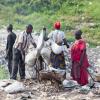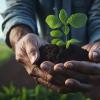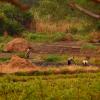
The Sub-Saharan Africa Regional Member Organization (SSARMO) includes 17 African countries* who are participating in the Science Granting Councils Initiative (SGCI) in Sub-Saharan Africa – a multi-partner, multi-institutional initiative established in 2015 aimed at strengthening institutional capacities of Science Granting Councils in the region.
The regional membership application was made in response to a statement of the 98th IIASA Council meeting in June 2021, which conceptualized a regional membership model aimed at bringing together multiple countries within a region, who are facing similar challenges, but may not have the means or capacity as individual countries to join IIASA as national members.
* Botswana, Burkina Faso, Côte d’Ivoire, Ethiopia, Ghana, Kenya, Malawi, Mozambique, Namibia, Nigeria, Rwanda, Senegal, South Africa, Tanzania, Uganda, Zambia, Zimbabwe
 © IIASA
© IIASA
IIASA Connect
Are you a member of our Sub-Saharan Africa regional community? IIASA Connect is our exclusive platform bringing this network together. Join today!
News

15 April 2024
Collaborating to devise a strategy for organic waste management in Uganda

12 December 2023
Giacomo Falchetta receives the IAMC Best Online Poster Award

20 October 2023
Successful joint workshop supports equitable development in rural Africa
Events
Focus

08 July 2024
Future food demand in The Gambia: can increased crop productivity and climate adaptation close the supply–demand gap?
The Gambia faces significant food availability issues due to low agricultural productivity. IIASA researchers and colleagues used the FABLE Calculator to explore actions to reduce the food supply-demand gap by 2050. The results, published in Food Security, reveal that current cropland will not meet food demand by 2050.
09 November 2023
IIASA Connect: Building impactful regional communities

Publications
Avidar, O. (2024). A holistic framework for evaluating and planning sustainable rural drinking water projects in sub-Saharan Africa. Journal of Rural Studies 107 e103243. 10.1016/j.jrurstud.2024.103243. Falchetta, G. , Vinca, A. , Trost, A., Tuninetti, M., Ireland, G., Byers, E. , Hafner, M., & Zulu, A. (2024). Achieving renewable energy-centered sustainable development futures for rural Africa. DOI:10.5194/egusphere-egu24-15943. In: EGU General Assembly 2024, 14-19 April 2024, Vienna. Jurasz, J., Guezgouz, M., Campana, P.E., Kaźmierczak, B., Kuriqi, A., Bloomfield, H., Hingray, B., Canales, F.A., Hunt, J. , Sterl, S., & Elkadeem, M.R. (2024). Complementarity of wind and solar power in North Africa: Potential for alleviating energy droughts and impacts of the North Atlantic Oscillation. Renewable and Sustainable Energy Reviews 191 e114181. Leip, D., Rovenskaya, E., & Wildemeersch, M. (2024). Risk-adjusted decision making can help protect food supply and farmer livelihoods in West Africa. Communications Earth & Environment 5 (1) e101. 10.1038/s43247-024-01242-9. Gomez Sanabria, A. & Höglund-Isaksson, L. (2023). A comprehensive model for promoting effective decision-making and sustained climate change stabilization for South Africa. IIASA Report. Laxenburg, Austria: IIASA